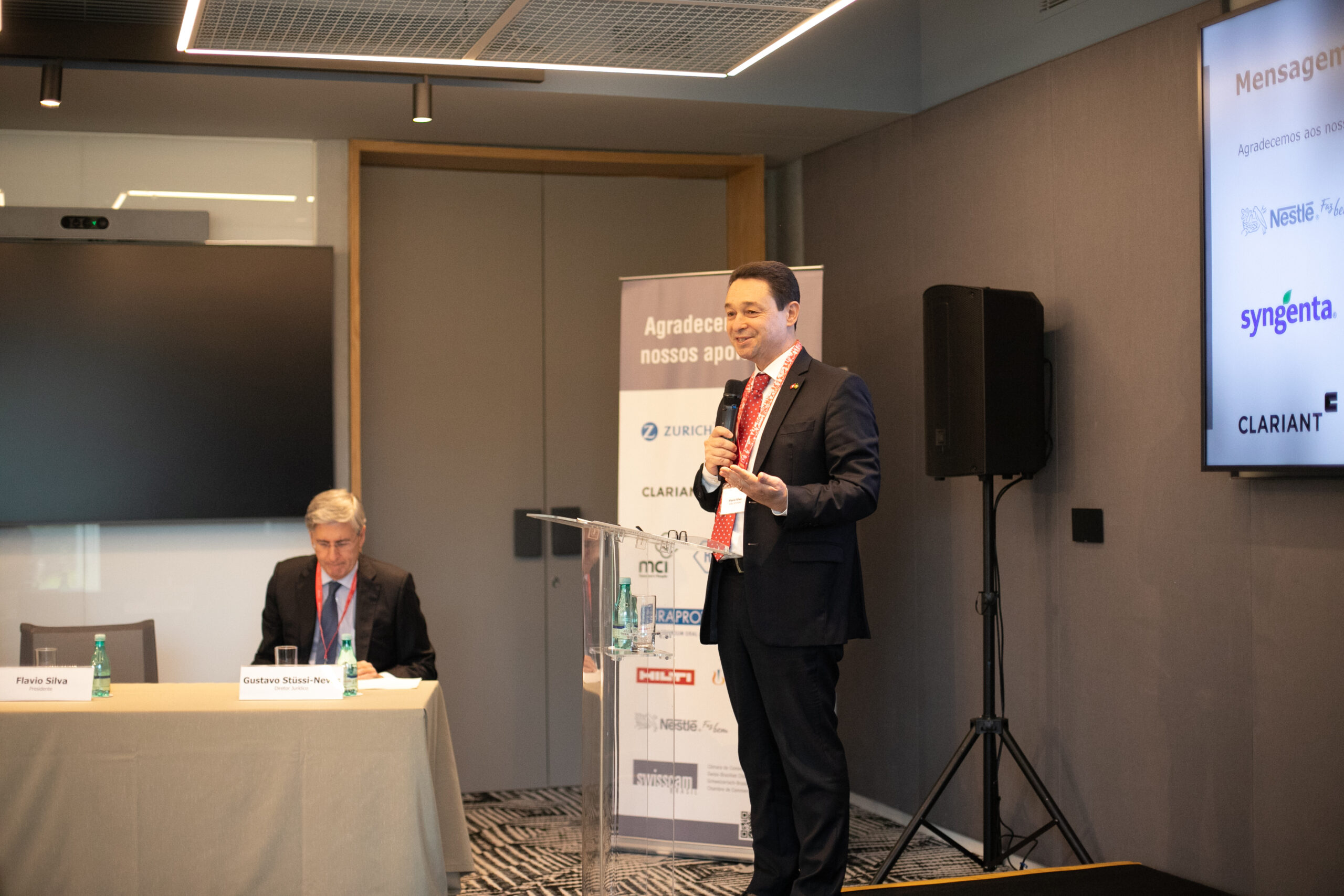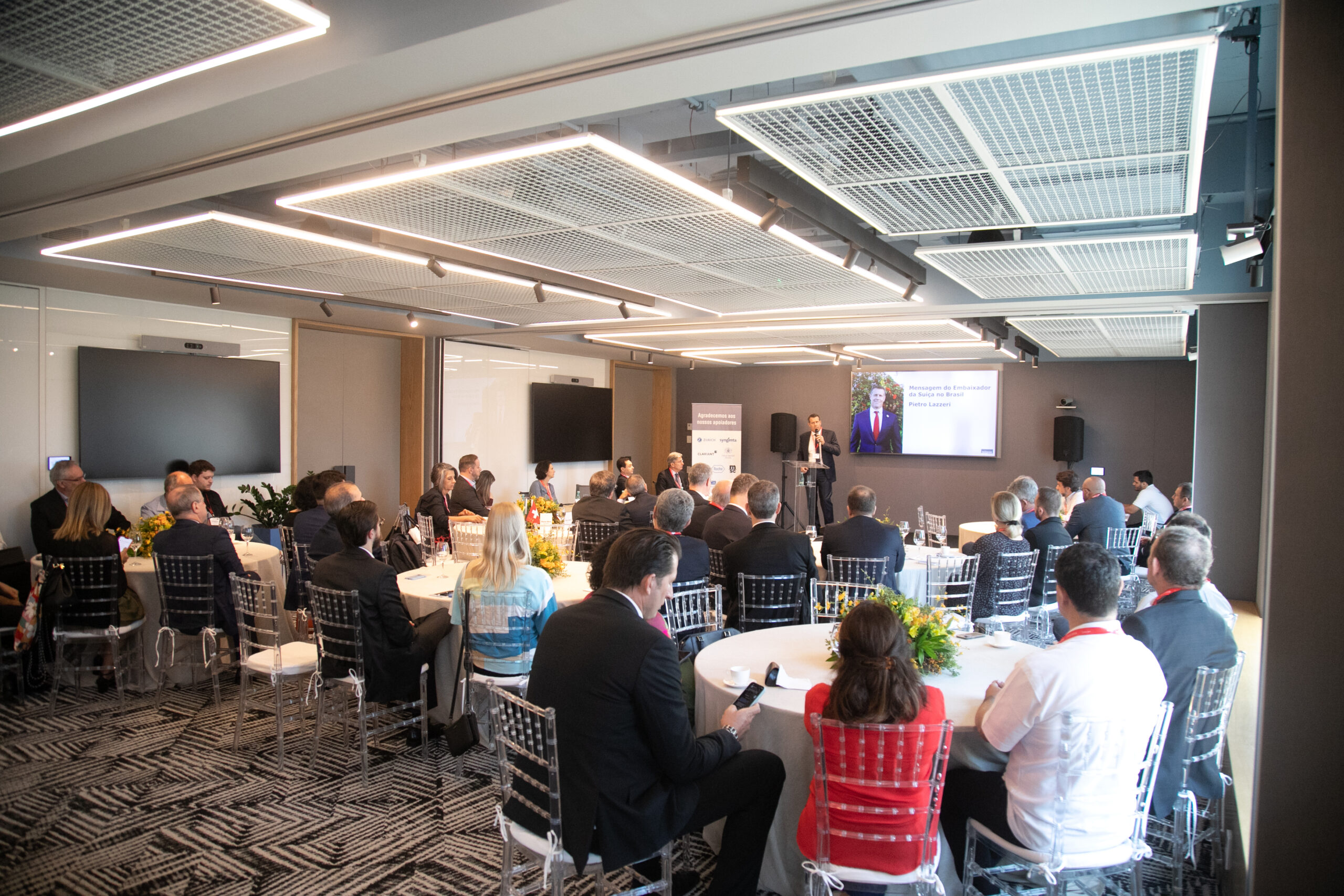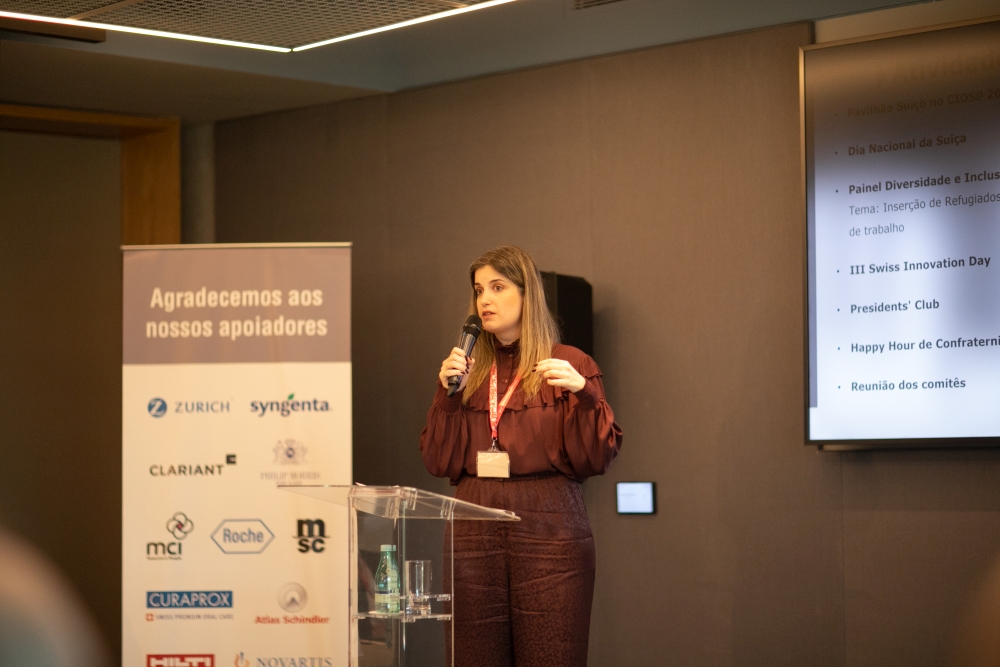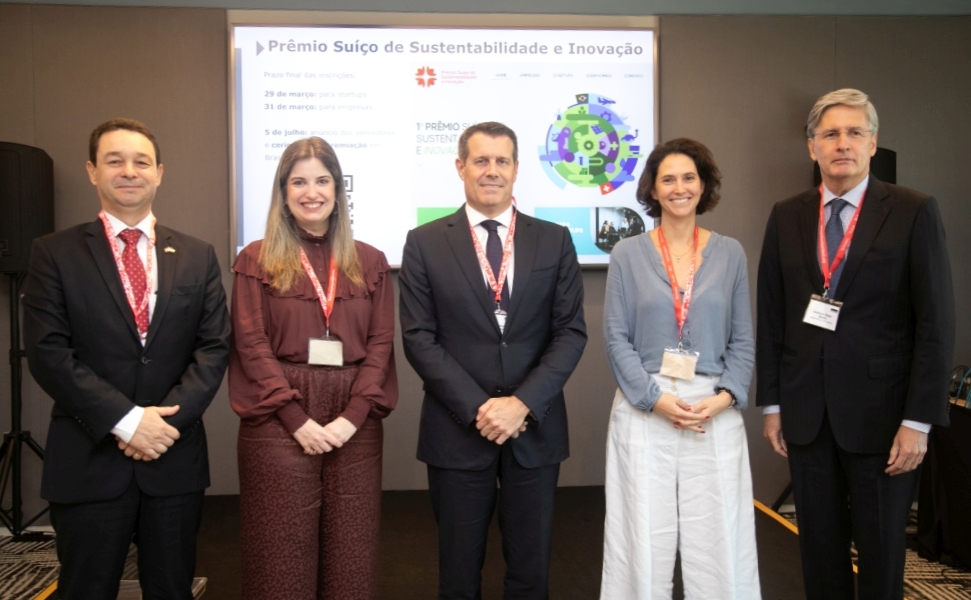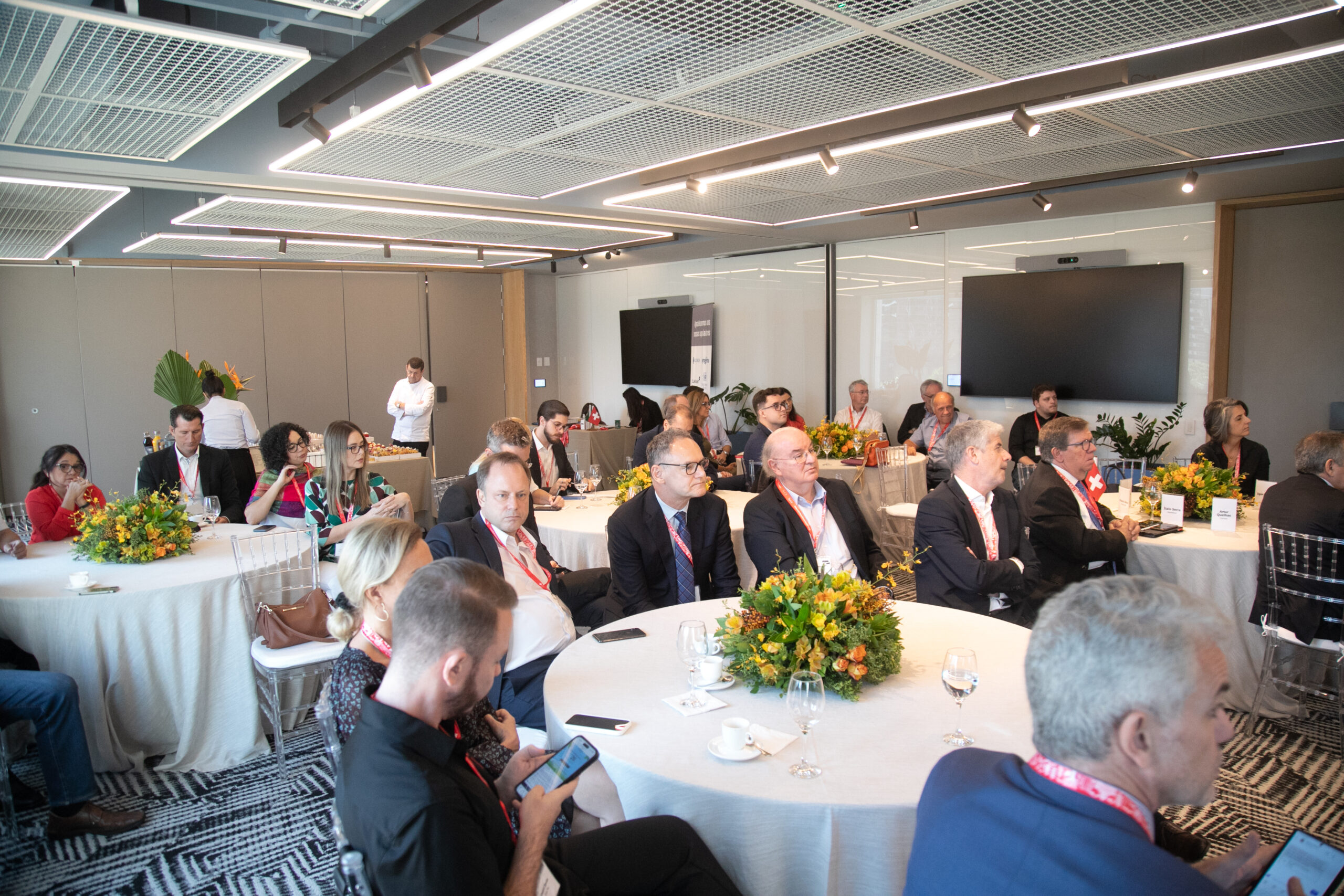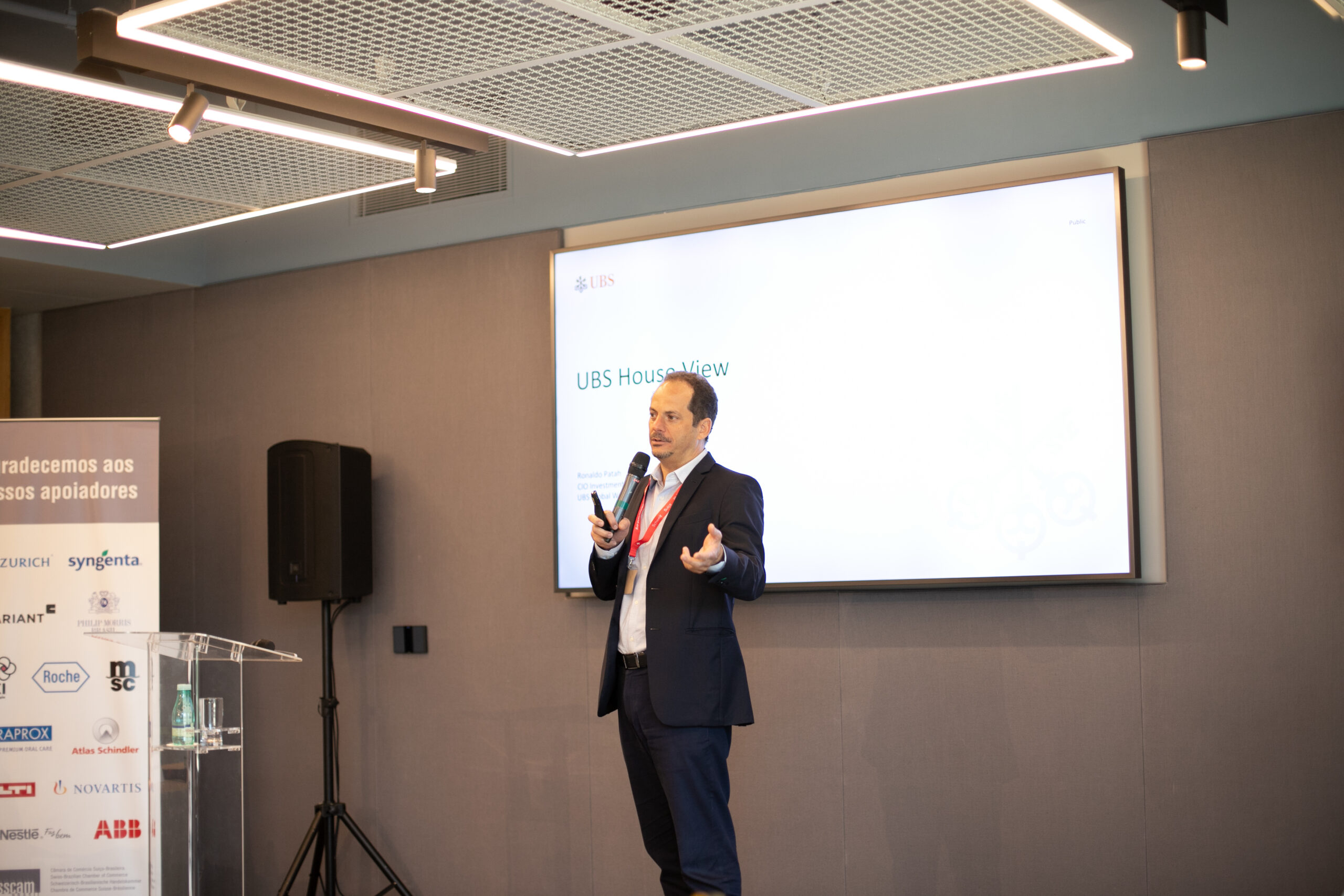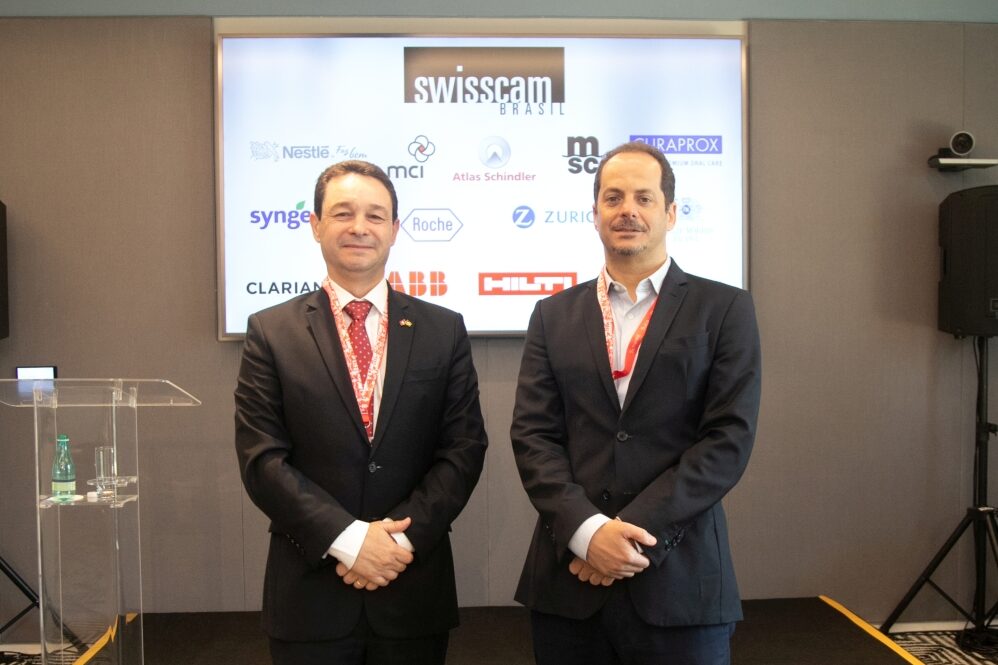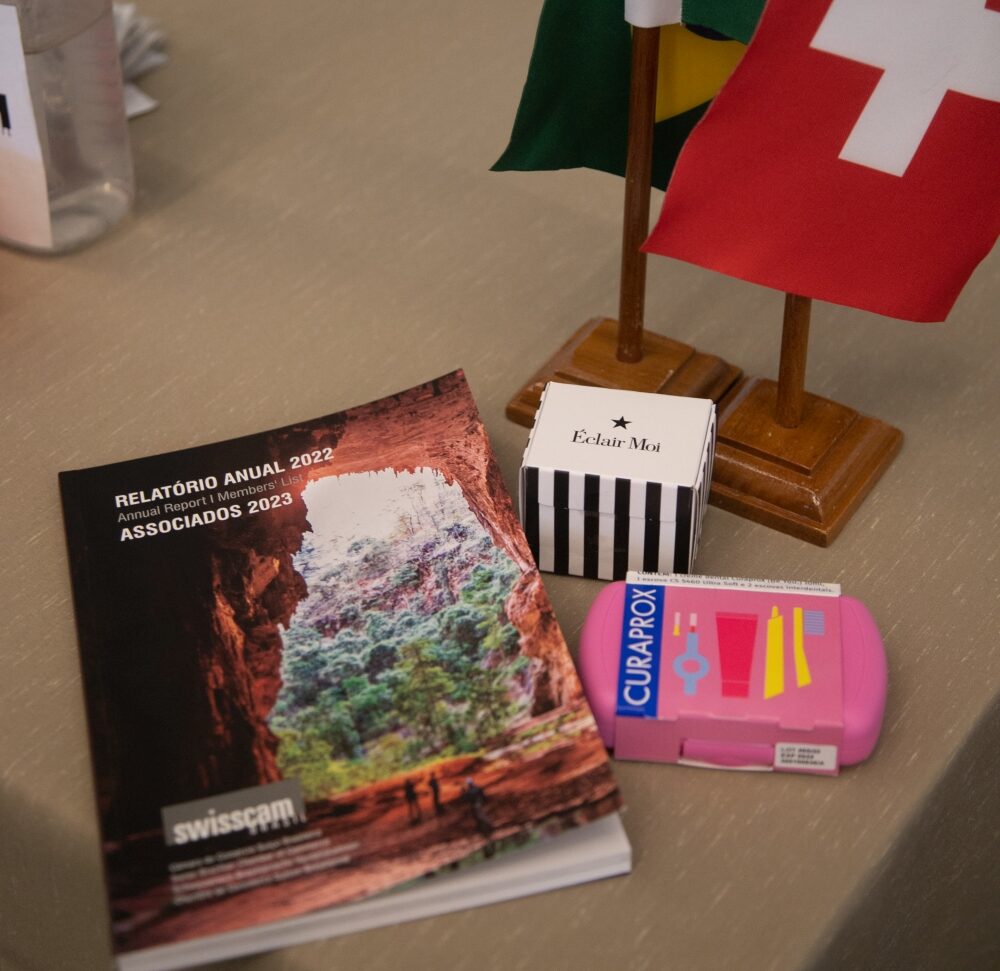On March 23, 2023, the Annual General Meeting of SWISSCAM was held at the UBS auditorium in São Paulo.
The President of SWISSCAM, Flavio Silva, opened the event by thanking all the members, especially UBS for providing the space and the Gold members for sponsoring our events: ABB, Atlas Schindler, Curaprox, Clariant, Hilti, MCI, MSC, Nestlé, Novartis, Philip Morris, Roche, Syngenta, and Zurich. He highlighted the dedication of the Board members who voluntarily work for the well-function of the chamber and the interests of the associates.
The Swiss Ambassador to Brazil, Pietro Lazzeri, took the floor and emphasized that Brazil is Switzerland’s biggest partner in Latin America. Therefore, promoting Swiss interests and values in the country is crucial. He mentioned the Davos Forum last January, when meetings with ministries and several governors happened, including the one with the governor of the State of São Paulo. For this year’s agenda, he highlighted some visits, such as the President of the Swiss Parliament with a delegation of representatives from all parties from the cities of Belém, Brasília, and São Paulo in May. In the first week of July, the Minister of Economy, Research and Innovation, Federal Counselor Guy Parmelin, will be in São Paulo, Rio de Janeiro, and Brasília with an important business delegation, whose agenda will include infrastructure, CleanTech, MedTech, and the EFTA – Mercosur Free Trade Agreement. The Ambassador emphasized cooperation with companies, as it is not just about the political discussion. It is necessary to have the support of the private sector to accomplish these objectives. The visit of the President of the Swiss Confederation is also confirmed for the beginning of October.
Regarding the sustainability topic, the Ambassador highlighted the engagement of the Sustainability Working Group, a cooperation among the Embassy, SWISSCAM, Swissnex, Instituto Ekos, and Swiss Business Hub. The group brings the Swiss Sustainability and Innovation Award to Brazil for the first time to promote the solutions of Swiss and Brazilian startups and allow more visibility to the sustainability initiatives of Swiss companies in Brazil.
He ended by mentioning some activities that are happening this year, such as the Web Summit in Rio de Janeiro in May, the Swiss National dates in São Paulo, Brasília, and Rio de Janeiro, the Rio Montreux Jazz Festival in Rio de Janeiro in October, the ceremony of the Swiss Sustainability and Innovation Award in Brasilia in the first week of July, with the presence of Vice-President Geraldo Alckmin and Federal Councilor Guy Parmelin, and the Swiss Day in São Paulo in early October with the participation of the President of Confederation.
Executive Director Mariana Badra continued by presenting the activities carried out in 2022 and the launch of the Annual Report, whose focus in this edition is sustainability. For this, images of the Cavernas do Peruaçu National Park were published, a protected area in the north of Minas Gerais that houses 180 caves, where the most notorious is Gruta do Janelão, having in its main gallery, heights and widths reaching more than 100 m, in addition to archaeological sites with cave paintings dating back up to 9,000 years. Mariana also presented the financial result for 2022, the board composition, the budget for 2023, and the planned activities.
Legal Director Gustavo Stüssi conducted the formalities for approving the accounts and electing the board, with the entry of new members: Grazielle Parenti (Syngenta) as 2nd Vice-President and Artur Quelhas (Clariant) and Fausto Almeida (ABB) as Directors.
After the Assembly, Ronaldo Patah, CIO of UBS Wealth Management in Brazil, lectured the associates about “The Year of Inflection”.
Patah began by talking about the global economic and political scenario. In one of the considered most important weeks of the year, the US central bank announced relevant measures including extensive guarantee lines, after some banks needed to be rescued (3 Americans and 1 Swiss): an unusual situation that could create a global trust crisis, if central banks had not acted quickly. Nowadays, there is an aggravating factor: by having the possibility of making withdrawals through an application at any time, a bank can fail in less than 24 hours. Financial risk is bulkier, even for traditional banks, which increasingly require bank management and very sophisticated risk management. Patah mentions primitive errors in the case of American banks, such as having only one type of customer.
The USA is still far from the stipulated inflation target, and to reduce it is necessary to keep the interest rate high. One of the factors making this fall difficult is the surplus of job offers compared to unemployed people in the country. Among the possible reasons is the pandemic that cut many people from the job market, including those retired, fatal victims of COVID, and those who adapted to a new work format on their own. In Patah’s words, we face a new sociological phenomenon that central banks still don’t know how to deal with. Considering these factors and including a possible banking crisis, the risk of a US recession has increased. Banks will have to raise lending rates or be more discerning in credit parameters.
The only economic block in the world that has accelerated growth is China, also due to the delay in the post-COVID reopening process. With that, perhaps the best investment opportunities today are there.
Concerning Europe, Patah mentions that until last year, there was a fear of inflation due to the high gas price. However, after a mild winter when there was no gas shortage and after a year of war in Ukraine, the price returned to normal. As there is no prospect of the war ending, sanctions against Russia must continue. Therefore, Europe continues to look for ways to diversify energy sources, buying time until next winter. The economy is already recovering, and the economic activity data for the first two months of the year were positive and above expectations.
Regarding investment recommendations, there is a preference for fixed-income investments given the presented information. The high-yield market should be avoided due to the risk of recession and corporate default. The high-grade market and emerging markets, especially China, can reach a return of 5%, 6%, and 7% per year in dollars, depending on the bond maturity, a return to risk much higher than variable income.
As for Brazil, he cites the report “Keep Calm and Fixed Income II” by UBS, which demonstrates why investment in fixed income seems very attractive in terms of risk. For this, he goes back a little to history since the boom at the time of Lula’s first election, which surfed on the wave of commodities. During Lula’s two terms, Brazil grew by 7% a year. Then came the sequence of mistakes, the first being the choice of Dilma as successor. The economic policies focused only on growth and not on inflation until 2013 inflation exploded. There was a negative shock of confidence, and companies stopped investing, causing the largest recession in history, reaching a 7% drop in GDP.
After 2016 impeachment, GDP grew again with the return of investor confidence and several main reforms followed for six years, contributing to the fact that in 2022, contrary to the pessimistic forecasts of economists, GDP would grow by almost 3%, thanks to investments, even though it was an election year. The fourth quarter, however, presented a negative result, and the first two months of 2023 were not good either. If economic policies are not right and business confidence is withdrawn, there is a high chance of entering a recession. Depending on the proposal that the government presents for the fiscal framework, which everything indicates will have some credibility, and for the tax reform, the situation could improve. According to the Eurasia Group, the proposals have respectively an 80% and 70% chance of being approved. Hence, it is not believed the debt will get out of control. For this reason, what seems most interesting today is to continue investing in post-fixed fixed income, considering this interest rate of 13.75% from the Central Bank, which is very high and will continue for a few more months.
The event ended with a lunch for members, who received gifts from our members Curaprox and Éclair Moi.

